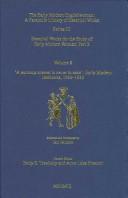| Listing 1 - 2 of 2 |
Sort by
|

ISBN: 9780754651703 0754651703 9781315263571 9781351961448 Year: 2007 Volume: 8 Publisher: Aldershot [etc.] Ashgate
Abstract | Keywords | Export | Availability | Bookmark
 Loading...
Loading...Choose an application
- Reference Manager
- EndNote
- RefWorks (Direct export to RefWorks)
By turns witty and inane, crude and learned, scurrilous and moralistic, jestbooks offer an important and often overlooked viewpoint on the lives of women in early modern England. This volume reproduces seven jestbooks with connections to early modern Englishwomen as well as showing something of the broad genre itself. Four have a direct connection to women through their jests and framing ("Wyddow Edyth", "Westward for Smelts", "Long Meg of Westminster", and "Pasqvils Lests"), excerpts from two books specifically focus on women in some sections ("The Schoolmaster" and "Wits Fittes and Fancies") and the volume also includes the extremely popular, general jestbook ("A C. Mery Talys").
English literature --- Jestbooks, English --- Women --- Human females --- Wimmin --- Woman --- Womon --- Womyn --- Females --- Human beings --- Femininity --- English jestbooks --- History
Book
ISBN: 1501722360 Year: 2018 Publisher: Ithaca, NY : Cornell University Press,
Abstract | Keywords | Export | Availability | Bookmark
 Loading...
Loading...Choose an application
- Reference Manager
- EndNote
- RefWorks (Direct export to RefWorks)
In a study that explodes the assumption that early modern comic culture was created by men for men, Pamela Allen Brown shows that jest books, plays, and ballads represented women as laugh-getters and sought out the laughter of ordinary women. Disputing the claim that non-elite women had little access to popular culture because of their low literacy and social marginality, Brown demonstrates that women often bested all comers in the arenas of jesting, gaining a few heady moments of agency. Juxtaposing the literature of jest against court records, sermons, and conduct books, Brown employs a witty, entertaining style to propose that non-elite women used jests to test the limits of their subjection. She also shows how women's mocking laughter could function as a means of social control in closely watched neighborhoods. While official culture beatified the sheep-like wife and disciplined the scold, jesting culture often applauded the satiric shrew, whether her target was priest, cuckold, or rapist. Brown argues that listening for women's laughter can shed light on both the dramas of the street and those of the stage: plays from The Massacre of the Innocents to The Merry Wives of Windsor to The Woman's Prize taught audiences the importance of gossips' alliances as protection against slanderers, lechers, tyrants, and wife-beaters. Other jests, ballads, jigs, and plays show women reveling in tales of female roguery or scoffing at the perverse patience of Griselda. As Brown points out, some women found Griselda types annoying and even foolish: better be a shrew than a sheep.
Women in literature. --- Sex role in literature. --- Comic, The, in literature. --- Jestbooks, English --- English wit and humor --- English drama (Comedy) --- English drama --- Women and literature --- History. --- History and criticism. --- History
| Listing 1 - 2 of 2 |
Sort by
|

 Search
Search Feedback
Feedback About
About Help
Help News
News